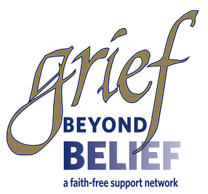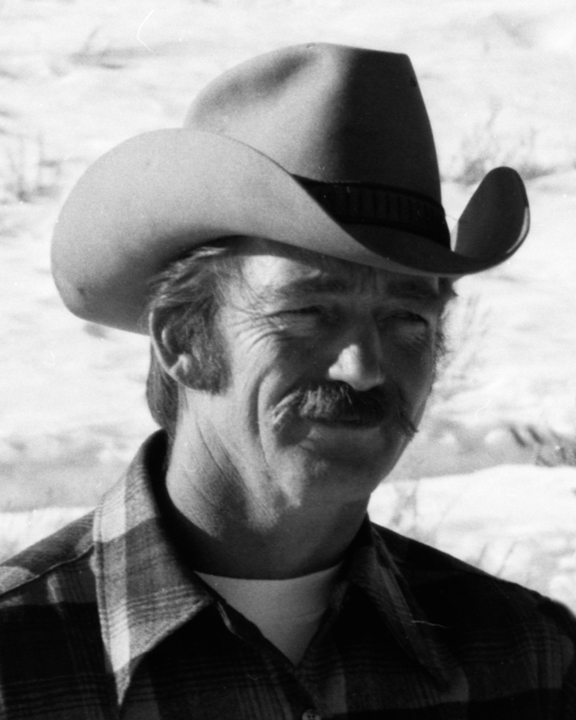 I’m an avid supporter of Grief Beyond Belief. Grappling with the death of a loved one — human or animal — is monstrously difficult, easily the most jarring event a person can ever undergo. Throwing religion into it, for someone who is NOT religious, only adds to the suffering.
I’m an avid supporter of Grief Beyond Belief. Grappling with the death of a loved one — human or animal — is monstrously difficult, easily the most jarring event a person can ever undergo. Throwing religion into it, for someone who is NOT religious, only adds to the suffering.
Having a support network for grieving unbelievers is an absolute necessity, in my view. Anything less is, simply, cruel. But it’s a cruelty that’s gone unrecognized, unlamented by society at large. The goddy majority that can’t imagine a life without gods also can’t imagine reacting to life crises, or supporting those who are, without gods. They’ve either left us alone (rarely!), or intruded with fervent preaching — at the hospital, at the memorial service, in the days and weeks following — at a time when the last thing a grieving nonbeliever needs is More. Fucking. Preaching.
Intended or not, the message that blares out at us is “YOUR FEELINGS ARE NOTHING! STOP THIS WHINY GRIEVING AND BELIEVE IN JESUS AND GOD AND HEAVEN!”
Grief Beyond Belief is an alternative. A crucial NECESSARY place where unbelievers can express grief and share stories, where empathy and counseling can take place without the preaching. Where grieving unbelievers can feel visible rather than invisible.
I have a second, larger reason for supporting it, one that goes beyond my own experience of grief.
I think about atheism all the time. Not in the sense that I compulsively fixate on it, but in the sense that I try to understand what things would be like without religion. What our society, our language, our selves would be like.
I strongly suspect even fellow atheists/agnostics/humanists have little idea. We make the atheist journey as individuals and then rest content, most of us, in our own private mental freedom. When it comes to envisioning an entire society free of religion, we have difficulty even thinking about it. We can’t imagine how different life might be if we cast off the social structures and viewpoints grown out of, and fertilized by, thousands of years of religiosity.
And yet … you have to believe it would be better, possibly vastly better, in pretty much every way. The difference between a majority of us “believing” a seductive falsehood and that same majority knowing true things has to be huge. It would change not only the structure of society, but our individual selves, in health-giving, life-affirming ways.
But in the same way my own unbelief took a good 20 years to mature, even if we flipped to an atheist majority today, a lot of the really good results would take time to develop. Possibly hundreds of years.
I wish we were at the far end of that journey. Instead, we’re here at the beginning. We have no idea what sorts of things we’ll discover along the way. But one of the things I hope we’ll find is that death and grief is only one aspect of a much larger view of life, and that taking this more realistic view of death and dying will transform all the rest of life in fantastically positive ways.
The transformation starts here :
________________________________________
Press Release
SECULAR GRIEF-SUPPORT NETWORK, GRIEF BEYOND BELIEF,
LAUNCHES WEBSITE
On Thursday, June 19th, secular grief support network Grief Beyond Belief will celebrate three years of providing comfort and community to bereaved nonbelievers with the launch of griefbeyondbelief.org, the internet’s first faith-free grief-support website,
Founded by school counselor Rebecca Hensler following the death of her son, Grief Beyond Belief has been operating on Facebook for three years, providing grieving atheists, Humanists and other Freethinkers with spaces in which to share compassion and advice without the uncomfortable intrusions of prayer and proselytizing. From the page’s much-welcomed launch on Facebook in June 2011, to its surprising growth following glowing coverage in USA Today in Spring of 2012, to its expansion to a confidential Facebook support group the following fall, the community has continued to serve the growing secular population’s need for grief-support appropriate for those who do not believe in a higher power or an afterlife.
“When our Facebook Page reached ten thousand “likes” and our support group swelled to over a thousand members,” explains Hensler, “it became clear that it was time to expand to an independent website where we could provide additional resources for grieving nonbelievers.”
The website offers a number of features previously unavailable through Grief Beyond Belief’s Facebook-based presence, including:
- The world’s largest collection of purely secular grief-related writing, videos, and podcasts, presented in a library of over 250 links sortable by topic or medium.
- A directory of grief resources, including a growing list of secular and Humanist funeral officiants in over 25 US states and 4 countries.
- A blog, which will feature links to newly published writing, news and other media related to secular grief as well as content written specifically for Grief Beyond Belief.
- Interactive forums in which members can share thoughts, feelings and stories, seek and offer comfort and advice, and post tributes to the loved ones for whom they are grieving.
The forum feature also allows subgroups within the network to delve deeper into shared experiences, such as grieving while leaving religion, or losses in common, such as miscarriage or bereavement by suicide.
The evolution of Grief Beyond Belief from a Facebook-based support community to an independent website marks an important step in the progress of the secular support movement, a step that is not going unnoticed by leaders and opinion-makers in the secular world.
“I’m so glad Grief Beyond Belief is expanding into a website,” says Greta Christina, author of the newly released Coming Out Atheist: How to Do It, How to Help Each Other,and Why. “The service they provide is so important, and now it’ll be much more accessible to a lot more people. The secular grief library and resource guide alone make the site invaluable. And with the website format, it’ll be much easier for grieving non-believers to talk with each other about specific issues they’re dealing with. It’s a big development.”
Sarah Morehead, the Executive Director of Recovering from Religion and American Atheists’ 2013 Atheist of the Year, agrees with Christina about the importance of Grief Beyond Belief’s mission. “People experiencing the heartache and emotional trauma of loss need comfort, community, and acceptance…not conversion attempts.”
Morehead explains how Grief Beyond Belief fits into the larger movement to provide for the emotional needs of the secular community: “Recovering From Religion regularly refers people to Grief Beyond Belief and we see firsthand how much people appreciate a safe, secular, and caring place to deal with the challenging emotions related to the grieving process. Seeing the concept grow from a social media, grassroots effort to a cohesive resource center is truly fantastic, and we are tremendously proud to support and encourage them at every step.”
The website’s launch on June 19, 2014 has been over a year in the planning, as the project has depended on a small group of volunteers to design the site, collect and input links for the library, and gather contact information for the resource directory. All the while, Hensler, her co-administrator, Nita Grigson, and a handful of moderators have continued to provide safe spaces for grieving nonbelievers on Faceboook and plan for the future of secular grief support.
“I know that the next step is to bring secular peer-to-peer grief support into the real world,” says Hensler. “But for now, griefbeyondbelief.org is going to help a whole lot of people who are grieving without faith feel far less alone.”



